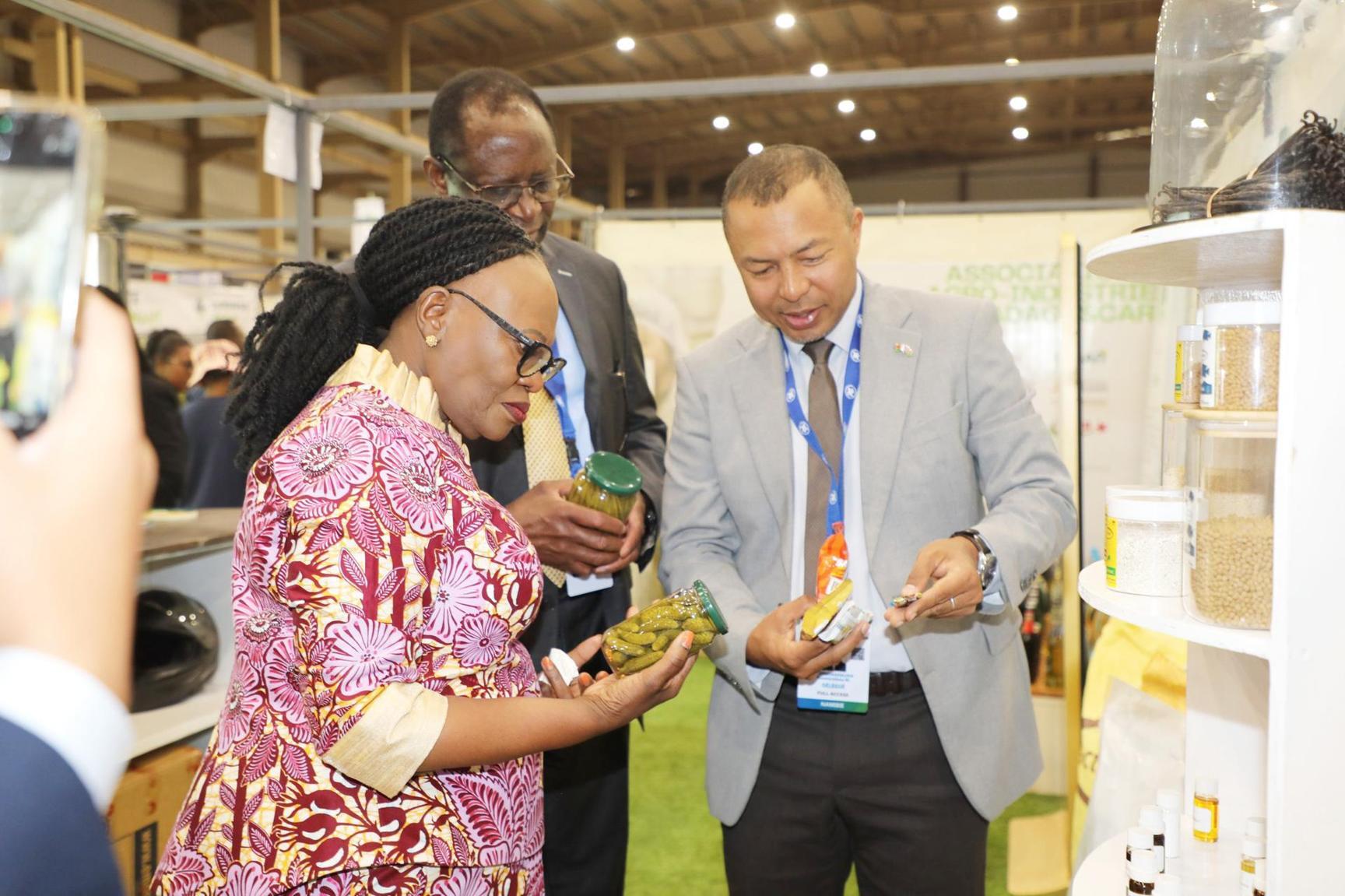Africa-Press – Namibia. Namibia and Madagascar have laid the groundwork for a new era of cooperation that promises to boost trade, cultural exchange and investment opportunities between the two nations.
This follows International Relations and Cooperation Minister Selma Ashipala-Musavyi’s official visit to Madagascar, where she participated in the Southern African Development Community (SADC) Summit.
She used the occasion to strengthen bilateral relations.
On the sidelines of the summit, Ashipala-Musavyi toured a handbag manufacturing company in Antananarivo, where local artisans are turning raffia into luxury fashion items. The visit left her inspired about the possibilities Namibia could unlock through its creative industries.
“This factory is producing designer handbags from raffia. I think the lesson we can take from here is that natural resources can be used in very creative and diverse ways,” she said.
She continued: “We also have similar products and resources in Namibia. This is why our President always talks about the importance of creative industries. It is about fusing our cultural heritage with modern design to create something unique and valuable”. The ministry added that Namibia is now considering sending young entrepreneurs to Madagascar to learn directly from the thriving creative industry sector.
“We want to bring some of our young people here to see what can be done. This is about getting out of our comfort zone, seeing what other African countries are doing, and bringing those lessons back home. It will help us build our economy, strengthen regional integration – and most importantly, give our youth opportunities to innovate,” she stated.
Ashipala-Musavyi linked her message to the government’s ongoing campaign to unlock economic growth by encouraging each Namibian region to identify and develop its unique strengths. The Namibian delegation also met with the country’s honorary consul in Madagascar, Rivo Andriamanalina, who has been at the forefront of promoting cooperation between the two countries.
Speaking after the interview with New Era, Andriamanalina emphasised the enormous potential for collaboration across multiple sectors. “We reviewed the potential areas of cooperation between Namibia and Madagascar. These include industry, agriculture, agro-processing, fashion, health and nutrition, as well as services such as telecommunications and water processing,” he said. Andriamanalina, who is also an entrepreneur and investor, remarked that he is eager to organise exchanges between Namibian and Malagasy business leaders.
“We would like to organise state visits and bring Namibian entrepreneurs here to meet Malagasy counterparts,” he said.
He stressed that cooperation must be rooted in people-to-people relations.
“Cooperation is based on trust, and that trust comes from knowing each other. That is why regular visits and exchanges are important, not only at the political level but also between businesses,” Andriamanalina said.
Agreements
One of the outcomes of the minister’s visit was an agreement to start drafting an agreement on political and economic consultations between Namibia and Madagascar.
This will lay the foundation for a future state visit, which both sides say will mark a milestone in the partnership.
“State visits are important because they allow leaders to know each other and create the political will necessary for cooperation,” Andriamanalina remarked.
He continued: “Once the political foundation is set, business and investment will naturally follow”. The consul noted that Namibia and Madagascar are well-positioned to complement each other’s strengths.
“Madagascar has a big market of about 31 million people, arable land and an abundant workforce. Namibia has a smaller population but a higher gross domestic product and stronger investment capacity. Together, we can complement each other. Namibia’s political stability and resources, combined with Madagascar’s market and manpower, create a powerful formula for growth,” he said.
Andriamanalina said Namibia and Madagascar share a unique historical bond, rooted in the liberation struggle.
He said the respect and mutual admiration between President Netumbo Nandi-Ndaitwah and her Malagasy counterpart is a strong anchor for bilateral relations.
“This is not only about political agreements, but also about the people. It starts with political will at the top. From there, business and cultural ties will naturally grow,” he added.
Opportunities
Ashipala-Musavyi and Andriamanalina believe that the cooperation could directly benefit ordinary Namibians, particularly by tackling unemployment and opening new avenues for entrepreneurs.
“We are not just talking about trade between governments. This is about creating opportunities for our young people, farmers, small businesses and investors. By working together, Namibia and Madagascar can build industries that are competitive in Africa and globally,” Andriamanalina said.
The consul said that if the cooperation is followed through, it could serve as a model for how African countries can use regional solidarity to achieve economic independence and reduce reliance on external markets.
For More News And Analysis About Namibia Follow Africa-Press






